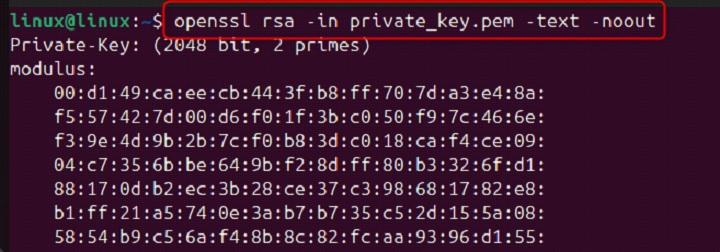
rsa Command in Linux
The rsa command is a part of the OpenSSL toolkit, which is widely used for implementing secure communications and managing cryptographic keys. This command specifically deals with RSA (Rivest-Shamir-Adleman) keys, allowing users to generate, convert, and manage RSA keys for encryption and decryption purposes.
By understanding the rsa command, you can effectively handle RSA key pairs, which are essential for secure communications and data encryption.
Table of Contents
Here is a comprehensive guide to the options available with the rsa command −
Syntax of rsa Command
The rsa command in OpenSSL follows a specific syntax that allows users to perform various operations on RSA keys −
openssl rsa [options]
options − Various flags and parameters that specify the operation to be performed on the RSA keys.
rsa Command Options
Here are several options that can be used with the rsa command in OpenSSL −
| Option | Description |
|---|---|
| -help | Display a summary of command options and usage. |
| -check | Verify the consistency and integrity of an RSA key. |
| -* | Use any supported cipher for encryption. |
| -engine val | Use a specific engine, possibly a hardware device, for cryptographic operations. |
| -in val | Specify the input file containing the RSA key. |
| -inform format | Define the input format (options: DER, PEM, P12, ENGINE). |
| -pubin | Expect a public key in the input file. |
| -RSAPublicKey_in | The input file contains an RSAPublicKey. |
| -passin val | Provide the passphrase source for the input file. |
| -out outfile | Specify the output file to write the RSA key. |
| -outform format | Define the output format (options: DER, PEM, PVK). |
| -pubout | Output the public key. |
| -passout val | Provide the passphrase source for the output file. |
| -noout | Do not print the key. |
| -text | Print the key in a readable text format. |
| -modulus | Print the modulus of the RSA key. |
| -traditional | Use the traditional format for private keys. |
| -provider-path val | Specify the path to load the provider (must be before the 'provider' argument if required). |
| -provider val | Load a specific provider (can be used multiple times). |
| -propquery val | Use a property query when fetching algorithms. |
Examples of rsa Command in Linux
Below are a few examples demonstrating the effective use of the rsa command on Linux −
- Generating an RSA Key Pair
- Extracting the Public Key
- Converting an RSA Key to Text Format
- Encrypting an RSA Private Key
- Verifying Key Consistency
- Displaying the RSA Key Modulus
Generating an RSA Key Pair
When you need to generate an RSA key pair, you can use this command −
openssl rsa -out private_key.pem 2048
This command generates a 2048-bit RSA private key and saves it to private_key.pem.

Extracting the Public Key
To extract the public key from the private key, you would use the following command −
openssl rsa -in private_key.pem -pubout -out public_key.pem
This command reads the private key from private_key.pem and outputs the corresponding public key to public_key.pem.

Converting an RSA Key to Text Format
If you want to display an RSA key in text format, use this command −
openssl rsa -in private_key.pem -text -noout
This command displays the private key in a readable text format without outputting the encoded key.

Encrypting an RSA Private Key
To encrypt an RSA private key with any supported cipher, you would use the following −
openssl rsa -in private_key.pem -out encrypted_private_key.pem -aes256
This command reads the private key from private_key.pem, encrypts it with the AES-256 cipher, and writes the encrypted key to encrypted_private_key.pem.

Verifying Key Consistency
To verify the consistency of an RSA key, you should use the -check option −
openssl rsa -in private_key.pem -check
This command checks the integrity and validity of the private key in private_key.pem.

Displaying the RSA Key Modulus
To output the modulus of an RSA key, you would use the -modulus option −
openssl rsa -in private_key.pem -modulus -noout
This command displays the modulus of the private key in private_key.pem.

Conclusion
The rsa in OpenSSL is a versatile command for managing RSA keys, offering various options to generate, convert, and validate RSA key pairs. By understanding and utilizing its different options, you can effectively handle RSA keys for secure communications and data encryption.
Whether you need to generate a key pair, extract a public key, convert a key to text format, or check the consistency of a key, the rsa command provides the necessary functionality.
With this comprehensive tutorial, you should now be well-equipped to use the rsa command effectively in your Linux environment.